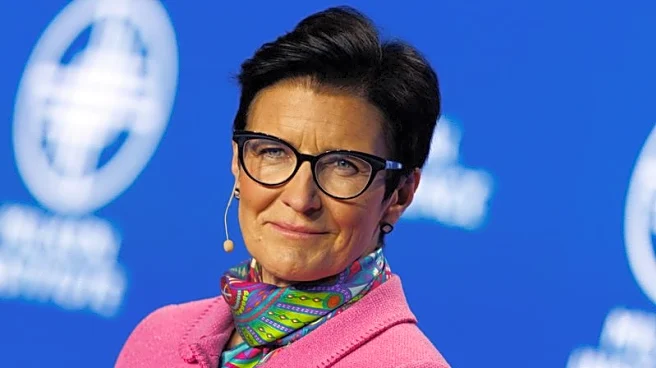What's Happening?
The World Economic Forum (WEF) has launched a National Space Strategy Toolkit aimed at assisting countries in developing or refining their space policies. This toolkit is designed to cater to both emerging
nations that are engaging in space policy discussions for the first time and established countries reassessing their current regulations. The toolkit provides recommendations and best practices tailored to a country's space objectives, capabilities, and key domains. Helen Burdett, WEF's head of planetary solutions, emphasized the importance of having a space strategy, noting that space data is increasingly integrated into various industries and government operations. The toolkit includes components to help nations determine their space priorities, select strategic objectives, identify essential needs, and receive recommendations to overcome funding or technological barriers. It also offers use cases from countries like the US, Japan, New Zealand, and Costa Rica, covering topics such as responsible space exploration and international partnerships.
Why It's Important?
The introduction of the WEF's Space Policy Toolkit is significant as it addresses the growing need for comprehensive space strategies amid increasing global reliance on space data. As more industries and governments integrate space data into their operations, having a clear and effective space policy becomes crucial for national security, economic growth, and scientific advancement. The toolkit encourages collaboration among policymakers and stakeholders, which is essential for the successful implementation of space strategies. By providing a framework for countries to develop their space policies, the WEF is fostering international cooperation and ensuring that nations can effectively navigate the complexities of space exploration and utilization. This initiative could lead to more standardized and responsible space practices globally, benefiting both emerging and established space-faring nations.
What's Next?
Countries are encouraged to engage with the toolkit alongside policymakers and regulators to ensure cohesive strategy development. The WEF aims to facilitate connections among stakeholders, promoting collaboration in the co-development of space policies. As nations begin to implement the toolkit's recommendations, there may be increased international dialogue and partnerships in space exploration and technology sharing. The toolkit's emphasis on collaboration suggests that future space policies will likely be more inclusive and comprehensive, potentially leading to new agreements and initiatives in global space governance.
Beyond the Headlines
The WEF's initiative highlights the ethical and legal dimensions of space exploration, as countries must consider responsible practices and international cooperation. The toolkit's focus on collaboration and stakeholder involvement underscores the importance of transparency and inclusivity in policy development. As space becomes an increasingly vital domain for national interests, the toolkit may influence long-term shifts in how countries approach space governance, potentially leading to more unified global standards and practices.










